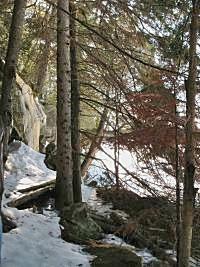|
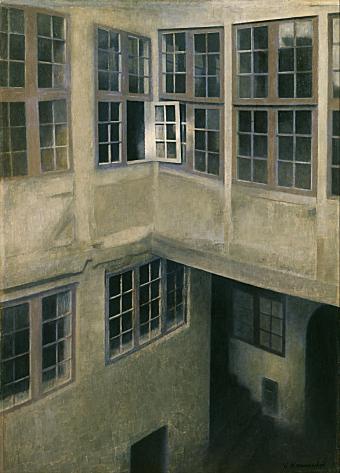
Vilhelm Hammershøi
(15 May 1864 – 13 February 1916)
_______________________
Against an Aesthetics of Disappearance
(review of Timothy Melley's The Covert Sphere)
Fabienne Collignon
electronic book review
(....)
The book’s objective ... is not a process of “uncovering” such “sedimentations” with a view—naive at best or else, catastrophically, offering a false exit—to “‘[heal]’ the wounded public sphere,” nor to posit the latter as “a transparent, democratic ideal” that exists in opposition to that other domain, suspended, as Agamben observes, in a void instigated by the deactivation and standstill of the force of law. Melley’s project, rather, starts—like Thomas Pynchon’s 1973 novel Gravity’s Rainbow—with a “progressive knotting into”: the “rational democracy” whose preservation depends on “psychological operations” that gradually transform government and the structure of the Habermasian public sphere as locus of reason. This merger, between the rational and covert spheres, calls into question the very foundations, processes, and terminology of so-called democratic states; to follow Agamben—because Melley’s book functions as a continuation of an absolutely fundamental interrogation of current political structures—democracy itself, as a system of government, becomes unclassifiable. This is essentially what Melley means when he talks about the “strange epistemology” of the covert sphere, defined as “an array of discursive forms and cultural institutions through which the public can “discuss” or, more exactly, fantasize the clandestine dimensions of the state”. Marked as irrational—the covert sphere as dreamworld—this zone is also paradoxically open: “[t]he secret is that there is no secret—or [...] that the most important secrets are public secrets”. Such statements further emphasize the impossibility to set up simple partitions between open and closed, or public and covert, systems while they further gesture towards the larger, disturbing matters that arise in states whose ostensible survival depends on black ops and juridically exceptional orders. To cite Agamben: “the clean opposition of democracy and dictatorship is misleading for any analysis of the governmental paradigms dominant today”.
...(more)
_______________________
Against Likeability
Emily M. Keeler
hazlitt
If you know someone who is easy to like, perhaps you don't know them terribly well. The base-level human mess, the mewling, clawed creature inside each of us, is not usually aired with a handshake or mutual Twitter follow. Literature unleashes that beast under the controlled circumstance of art, primarily because of its very intimate nature—the action literally happens inside your own head. Communion with a text, story, or character makes us confront the lowness of the human animal; if you're lucky, the confrontation will raise your spirit.
...(more)
_______________________
 Watchtower in the Eifel Region
1987
Sigmar Polke
(13 February 1941 – 10 June 2010)
_______________________
Two Poems
Juan Carlos Galeano
Translated by James Kimbrell and Rebecca Morgan
drunken boat
A canoe flies over the landing…
A canoe flies over the landing, and main street, but doesn't stop.
We play her favorite songs; holding gifts, we invite her down.
From their little towns in the sky, the planets and the prettiest stars wink at her.
We wish the canoe would come visit; wish she would take us to another river,
to other towns, to someplace else...
(In our body's rivers, desire comes and goes from an insecure port called heart).
But the canoe makes foam in the clouds with her oars and doesn't budge from her spot.
Why doesn't the canoe come to our town? Why doesn't she even listen to her own songs?
Why doesn't she want to row to the stars?
Perhaps in another river, another town; perhaps in another life, someplace else...
...(more)
_______________________
Chaos /// Concept /// Continuity – Deleuze and Survivability
Ian Alan Paul
A Line Is a Territory
“The old as well as the new machines are already destroying the Earth, so much so that … ‘survivability’ has become a political demand. In this case as well, so much is daily heard on the topic, that we risk repeating the obvious.” (Silvia Federici)
(....)
As the quote from Silvia Federici points out at the beginning of this text, in a time of generalized crisis, survivability, or the potential to have duration and life over time, comes to form the ground of political and ethical theories and demands in our present moment. Survivability, duration, and endurance are of course not entirely new concerns and in some way have always been a central problem of political and philosophical thought, but rarely have they positioned the survival of ecology itself as their ground. The struggle for survival, and the preservation of ecologies that make survival possible, can be approached as a question of the relationship between order and chaos: how do some things manage to hold together in a world in which everything seems to be continuously falling apart?
The question of survivability is always-already political and immediately makes clear a multiplicity of ethical and aesthetic dynamics: How do things come to survive? What constitutes survival? What should/shouldn’t survive? Is simply surviving enough? The ongoing ecological crisis makes these questions urgently important, and any politics that takes itself seriously must also seriously entangle itself with the questions of ecology and survivability. Survival, of course, is deeply imbricated in the various systems of power: there are class, gender, and race dynamics at work that differentially grant or deny access to systems of care and protection that radically affect survivability. When approaching these questions, it is also necessary to challenge the anthropocentric nature of these frames, and urge ourselves to confront the survivability of heterogeneous forms that work across ecologies to allow for human life in the first place: these includes plants, animals, and bacteria, but also architectures, the atmosphere,and even concepts/ideas themselves.
...(more)
via synthetic_zero
_______________________

Alyona Surikot
Ludwig Wittgenstein: A Happy World
presented by Tom Clark
beyond the pale
(....)For it is a fact of logic that wanting does not stand in any logical connexion with its own fulfilment.
And it is also clear that the world of the happy is a different world from the world of the unhappy.
(....)
How things stand, is God.
God is, how things stand.
Only from the consciousness of the uniqueness of my life arises religion — science — and art.
...(more)from Ludwig Wittgenstein: Notebooks 1914-1916
_______________________
On drowning
A review of 'I'll Drown My Book: Conceptual Writing by Women'
Editors: Caroline Bergvall, Laynie Browne, Teresa Carmody, Vanessa Place
Cecilia Corrigan
jacket2
A defining moment in the life cycle of any avant-garde movement is its declaration of aesthetic victory over the preceding team of textual innovators. These declarations of victory have proliferated over the twentieth century and into our own, ever since various modernist poets went to war against the previous century’s Romantic avant-garde’s elevation of ordinary vernaculars, “the real language of men” and “the spontaneous overflow of powerful feelings, recollected in tranquility.” Each successive movement has claimed less and less material territory than the militaristic roots of the word would suggest.
From Marinetti’s announcement that Futurists just “want to demolish museums and libraries, fight morality, feminism and all opportunist and utilitarian cowardice,” to Dada’s avowal that “DADA remains within the framework of European weaknesses, it’s still shit, but from now on we want to shit in different colours so as to adorn the zoo of art with all the flags of all the consulates,” the manifesto’s language shifts from that of violent revolution to a description of the highly personal experience of digestion. In its more recent iteration, the manifesto has emerged declaring a radical impotence, a refusal to lay claim even to the low-risk real estate of aesthetic conquest.
“It is not the job of poetry to solve the problems of the world, but to dumbly reflect them,” writes Conceptualist poet Vanessa Place, whose passive stance is echoed by her Conceptualist counterpart, Kenneth Goldsmith, who explains that “the best thing about conceptual poetry is that it doesn’t need to be read … my books, for example, are unreadable. All you need to know is the concept behind them.” Place and Goldsmith are the respective editors of I’ll Drown My Book: Conceptual Writing By Women and Against Expression, two major anthologies of conceptual writing to come out within a year of each other.
...(more)
_______________________
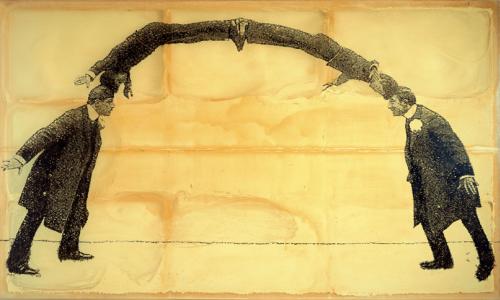
Sigmar Polke

Winter Painting
Max Beckmann
1930
_______________________
The BE/S
A Biosemiotics
Meredith Stricker
conjunctions
(....)
what if we are the language of others
sensorium
harmonium
what if language is both inside and outside the body
brokered
intraspecies, polyphonic
resource extraction
borders
what if we are the words
others’ mouths cannot form without us
threw open her hands
into raw unsewn
sparks set loose like bees glistening
air
selva obscura
crimson clover
dark woods dark words
where is everyone
hiding
frayed, sentient
jesus ...(more)
Mistake by Meredith Stricker Caketrain Chapbook
May 2012
Meredith Stricker in drunken boat
_______________________

Self Portrait With Horn
1938
Max Beckmann
b/ February 12, 1884
_______________________
Stuart Hall (1932 – 2014)
Tariq Ali
jacobin
(....)
He was a 1956-er. The twin crises that erupted that year – the Anglo-French-Israeli invasion of Egypt and the Soviet intervention in Hungary – created a dissidence that spanned Europe. In Britain this led to the emergence of the first wave New Left, which resulted in magazines, the creation of New Left Clubs all over the country, and the Campaign for Nuclear Disarmament. Alongside Stuart, EP Thompson, Ralph Miliband, Raymond Williams, Doris Lessing and many others played their parts. When Stuart became the first editor of the New Left Review, with a strongly interventionist and activist approach, his message was clear. If you want change, get off your backsides and challenge the existing order, but also think, argue, debate as to best way forward. This remains an important legacy.
(....)
In the oppressive aridity of neoliberal politics and culture, where the lies of its apologists are first worn as defensive masks but finally grow into their faces, his voice and his essays will be greatly missed. Unlike almost everyone else of his 1956 and later cohort, he did not write a book. Why, many asked, did he concentrate on the essay? Perhaps he liked the provisionality that lent itself to the shorter form. Or perhaps the masochistic practice of collective composition surrounded by sectarian twentysomethings at the Birmingham centre left him exhausted.
I don’t have the answer, but it doesn’t really matter. There is much to explore in what he has left behind, especially the refusal to banish the political from everyday thought.
...(more)
Stuart Hall obituary
Influential cultural theorist, campaigner and founding editor of the New Left Reviewguardian
_______________________
Let’s Keep Talking About Stuart Hall
Helen Stuhr-Rommereim
full stop
(....)
Stuart Hall, who passed away this week at the age of 82, was responsible for opening up this nebulous academic space insistently defiant of any specifying nomenclature. His commitment to an empathic politics outside of ideological absolutes, to allowing room in academic thought for more different kinds of voices, affected the humanities and social sciences profoundly and for the better. Indeed, Full Stop and publications like it are in great debt to Stuart Hall; he played a pivotal role in building the discourses that currently allow us to spin cultural phenomena into broader understandings of social and political conditions. He emphasized the instability of knowledge in a way that made more room for agency in critical thought, rather than less.
Listening to Hall expound on the impossibility of subjective truth, on how to grapple with a world in which all we have to hold onto is “the flux of experience,” is striking to me because he’s describing a way of thinking I’ve absorbed so completely it seems radical to try to imagine how that might not be the case. Hall was a leading figure in the New Left, a movement looking for a way out of post-war ideological gridlock and, as he put it, “an alternative, more humane, more just, more inclusive, more racially diverse, less patriarchal in its forms than either of the two Cold War alternatives.” He explained, “It means a politics which is much more self-reflexive, which is constantly inspecting the grounds of its own commitments, which can never hope to mobilize or inscribe support in an automatic way.”
Fifty years later, self-reflexive politics “constantly inspecting the grounds of its own commitments” may have gone too far. I left my liberal arts college education thoroughly exhausted by conversations about conversations about identity, looking for a way to think about the world outside of myself, but feeling locked in my own subjectivity. This, however, is the opposite of what Hall’s thinking was meant to foster. His understanding of identity emphasized our interlinkage with each other: “I don’t think that identity is a kind of essence that exists inside all the other things. I think identity is always contracted in a conversation between who we are and all the political ideologies out there.” In other words, identity is something mixed and shared and dispersed amongst particulars and universals. It is something that we can make decisions about ourselves, and it is something that can change.
Many others since Hall, perhaps most recognizably Judith Butler, have taken this way of thinking in truly paradigm-shifting directions. But Hall was notable not just for his ideas, but for the way he directed his energies as an academic. He was a true public intellectual, in the sense that his intellectual commitment was always to the public. For Hall this wasn’t about defying some vague notion of academic elitism or embracing shallow populism. It was no kind of self-aggrandizing rhetorical performance, but rather came out of a position of intellectual generosity and a commitment to rigorous, productive discourse on a mass scale.
...(more)
_______________________
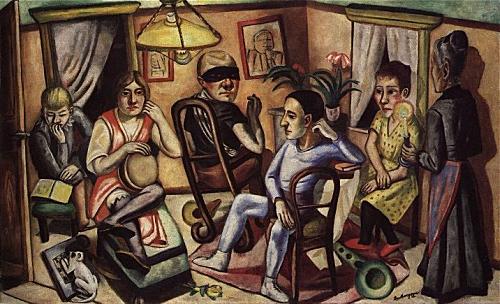
Before the masked ball
Max Beckmann
1922
_______________________
Kill the Philosopher in Your Head
Anne Boyer
new inquiry
(....)
The philosopher is, for Althusser, the one who has the chance to vanquish you to save you. The philosopher is uniquely capable of a revolutionary killing of the you in your head. But with Althusser, of course, killing can never just be a metaphor.
As Althusser could not comprehend how strangling a person resulted in her death, or even that her death was actually her death, and not his, so also he could not see that the little-p “philosophy” which occurs among the people is neither as wholly received nor as wholly placatory as he believed, nor is the Philosophy of the elite who fall into wells the people dug for them as revolutionary as he suspected. Indeed, the well-digger, unlike the philosopher, is the one who with a shovel moves the earth; it is the philosopher who is always waiting for ideas to fall from heaven. Although Althusser very much disagreed with this statement, we can return to the “unimproved” Marx for a reminder: “The philosophers have only interpreted the world, in various ways; the point is to change it.” Philosophy can land you in a hole, but only action will get you out of it.
...(more)
via Forgottenness
_______________________
The Terrible Toll of Secrecy
Dan Froomkin
in
The Intercept
Editors: Glenn Greenwald, Jeremy Scahill, Laura Poitras
.....................................................
You Know Who Else Collected Metadata? The Stasi
Julia Angwin
_______________________
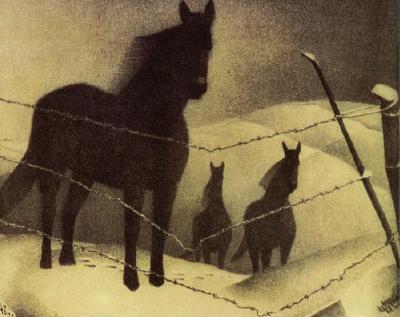
February, 1940
Grant Wood
(February 13, 1891 – February 12, 1942)
_______________________
[Murmurs from the earth of this land?]
Muriel Rukeyser
d. February 12, 1980
Murmurs from the earth of this land, from the caves and craters,
from the bowl of darkness. Down watercourses of our
dragon childhood, where we ran barefoot.
We stand as growing women and men. Murmurs come down
where water has not run for sixty years.
Murmurs from the tulip tree and the catalpa, from the ax of
the stars, from the house on fire, ringing of glass; from
the abandoned iron-black mill.
Stars with voices crying like mountain lions over forgotten
colors.
Blue directions and a horizon, milky around the cities where the
murmurs are deep enough to penetrate deep rock.
Trapping the lightning-bird, trapping the red central roots.
You know the murmurs. They come from your own throat.
You are the bridges to the city and the blazing food-plant green;
The sun of plants speaks in your voice, and the infinite shells of
accretions
A beach of dream before the smoking mirror.
You are close to that surf, and the leaves heated by noon, and
the star-ax, the miner’s glitter walls. The crests of the sea
Are the same strength you wake with, the darkness is the eyes
of children forming for a blaze of sight and soon, soon,
Everywhere, you own silence, who drink from the crater, the
nebula, one another, the changes of the soul.
_______________________

Departure
Max Beckmann
1932
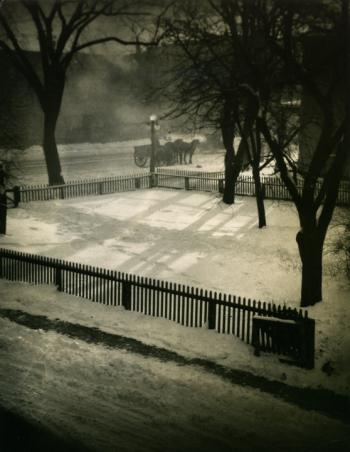
Middletown in the Snow
Connecticut, 1926
E.O. Hoppé
_______________________
Immanent Visitor
Selected Poems of Jaime Saenz
A Bilingual Edition
translated from the Spanish by Kent Johnson and Forrest Gander
online escholarship edition
from To Cross This Distance
Jaime Saenz
(1973)
translated by Kent Johnson and Forrest Gander
I
I am divided from myself by the distance I find myself in,
the one who is dead is divided from death by a great distance.
I plan to cross this distance, resting along the way.
Face up, in the dwelling of desire,
stock still, in my place—opposite the locked door,
with a winter's light at my side.
In the corners of my room, in the chair's arena.
With wavering memory splitting off from the void
—on the ceiling of the vault,
the one who is dead must communicate with death.
Contemplating the bones on the plank, numbering the darknesses with my fingers starting from you.
Seeing that things are, I fill with desire.
And I find myself crossing a great distance.
II
Like nocturnal air, the Festival of the Spirit is a finished thing,
like the ladder—leaning against a wall to hear the word—is a finished thing,
like the line I once traced, the line your shadow fled, is a finished thing.
Like the smoke in the braziers with the incense and the vapors spreading,
longing for voices,
like the lights and the mirrors rising toward the winter skies,
with the vanished memory of the customs and of those who are definitively distant in the distance,
thus it is that the implements and the skulls are no longer implements nor skulls,
in the ceremonies of winter, they are no longer used.
.....................................................
Five poems from: As the Comet Passes
Jaime Saenz
(1921-1986)
translated by Kent Johnson and Forrest Gander
_______________________
Lacking a homunculus
Eugene Thacker on Nietzche's Human, All Too Human
(....)
Human, All Too Human is a masterclass in the short form, an exegesis on the virtues of the ‘incomplete thought’, as prescient today in our era of the ‘overview effect’ as it was in Nietzsche’s era of Darwinism, industrialization and spiritualism. It is no accident that such experiments in the incomplete thought take as their subject the problem of the human. Above all, the phrase ‘human, all too human’ signals the beginning of a trajectory that would reach across all of Nietzsche’s writings, and would continue into the rediscovery of his work by generations of twentieth-century philosophers and theorists. Handwerk concisely summarizes this trajectory in his Afterword to the second volume: ‘Human beings, these aphorisms and mini-essays continue to remind us, are only human, and we would be far better off shaking our recurrent illusion that we are divine, along with the equally recurrent illusion that we are simply bestial.’ Were Nietzsche writing today – doubtless working as a part-time adjunct instructor teaching online courses from home – he might very well regard the flora and fauna of contemporary theory, from nonhuman actants to posthumanism to objects and hyperobjects, as so many varieties of this impulse to redeem the human, through the back door, the side door, a trap door… The so-called ‘overview effect’ can, however, be presented in a different way: the condition of the human as its inability to decondition itself, the horizon of the non-human reflected back as the ‘gleaming and floating gravesite of humanity’.
...(more)
Radical Philosophy
_______________________

Vera Idelson
set design for Maschinenangst by Ruggero Vasari
From the Jan. 1925 issue of Der Sturm (Berlin)
Maschinenangst
Vera Idelson's costume and set design illustrations
for the Italian Futurist play
The Anguish of the Machines (La mascherata degli impotenti, 1923)
by Ruggero Vasari
50 Watts
_______________________
Confession Of One Who Flew
A. M. Pires Cabral
Translation by Richard Zenith
1.
But if in these six and a half decades
I was capable of some sort of flight
– which could only have been comparable
to the awkward and rudimentary flight
of chickens, with a great expenditure
of energy to achieve brief and desperate
moments of scant ascension,
but a kind of flying all the same,
by which I managed to stay aloft
in my lighter moments –
now, that cycle of flight having ended,
I must perch, the way birds do.
This isn’t like when a shop
changes its line of business
or closes to take inventory
at year’s end.
Nor is it like carrying out
an arrest warrant
or atoning for the disorderliness
of being a pedestrian who flew.
Nor is it the inevitable conclusion
to an act of sedition.
Perching, that’s all. Returning
to the endearing things of earth.
It’s the earth finally claiming what I owe her
and my claiming what she owes me
since my very first hour.
I flew, I’m flown out.
Without nostalgia.
...(more)
A. M. Pires Cabral at Poetry International
_______________________

Rooftops, Apartments, New York City
1921
E. O. Hoppé
1878 – 1972
_______________________
Le Promeneur Solitaire: W. G. Sebald On Robert Walser
The New Yorker
(....)
How is one to understand an author who was so beset by shadows and who, none the less, illumined every page with the most genial light, an author who created humorous sketches from pure despair, who almost always wrote the same thing and yet never repeated himself, to whom his own thoughts, honed on the tiniest details, became incomprehensible, who had his feet firmly on the ground yet was always getting lost in the clouds, whose prose has the tendency to dissolve upon reading, so that only a few hours later one can barely remember the ephemeral figures, events, and things of which it spoke. Was it a lady named Wanda or a wandering apprentice, Fräulein Elsa or Fräulein Edith, a steward, a servant, or Dostoyevsky’s Idiot, a conflagration in the theater or an ovation, the Battle of Sempach, a slap in the face or the return of the Prodigal, a stone urn, a suitcase, a pocketwatch or a pebble? Everything written in these incomparable books has—as their author might himself have said—a tendency to vanish into thin air. The very passage which a moment before seemed so significant can suddenly appear quite unremarkable.
(....)
The playful—and sometimes obsessive—working in with a fine brush of the most abstruse details is one of the most striking characteristics of Walser’s idiom. The word-eddies and turbulence created in the middle of a sentence by exaggerated participial constructions, or conglomerations of verbs such as haben helfen dürfen zu verhindern [have been able to help to prevent]; neologisms, such as for example das Manschettelige [cuffishness] or das Angstmeierliche [chicken-heartedness], which scuttle away under our gaze like millipedes; the “night-bird shyness, a flying-over-the-seas-in-the-dark, a soft inner whimpering” which, in a bold flight of metaphor, the narrator of The Robber claims hovers above one of Dürer’s female figures; deliberate curiosities such as the sofa “squeaching” [“gyxelnd”] under the charming weight of a seductive lady; the regionalisms, redolent of things long fallen into disuse; the almost manic loquaciousness—these are all elements in the painstaking process of elaboration Walser indulges in, out of a fear of reaching the end too quickly if—as is his inclination—he were to set down nothing but a beautifully curved line with no distracting branches or blossoms.
Indeed, the detour is, for Walser, a matter of survival. “These detours I’m making serve the end of filling time, for I really must pull of a book of considerable length, otherwise I’ll be even more deeply despised than I am now.” ...(more)
_______________________
Traces of Robert Walser 1 and 2
50watts

Tijuana, Mexico
E. O. Hoppé
1926
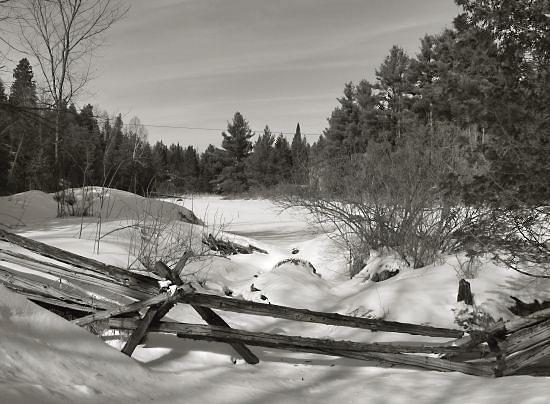
photo - mw
_______________________
The Hermit Goes Up Attic
Maxine Kumin
(June 6, 1925 – February 6, 2014)
Up attic, Lucas Harrison, God rest
his frugal bones, once kept a tidy account
by knifecut of some long-gone harvest.
The wood was new. The pitch ran down to blunt
the year: 1811, the score: 10, he carved
into the center rafter to represent
his loves, beatings, losses, hours, or maybe
the butternuts that taxed his back and starved
the red squirrels higher up each scabbed tree.
1812 ran better. If it was bushels he risked,
he would have set his sons to rake them ankle deep
for wintering over, for wrinkling off their husks
while downstairs he lulled his jo to sleep.
By 1816, whatever the crop goes sour.
Three tallies cut by the knife are all
in a powder of dead flies and wood dust pale as flour.
Death, if it came then, has since gone dry and small.
But the hermit makes this up. Nothing is known
under this rooftree keel veed in with chestnut
ribs. Up attic he always hears the ghosts
of Lucas Harrison's great trees complain
chafing against their mortised pegs,
a woman in childbirth pitching from side to side
until the wet head crowns between her legs
again, and again she will bear her man astride
and out of the brawl of sons he will drive like oxen
tight at the block and tackle, whipped to the trace,
come up these burly masts, these crossties broken
from their growing and buttoned into place.
Whatever it was is now a litter of shells.
Even at noon the attic vault is dim.
The hermit carves his own name in the sill
that someone after will take stock of him.
_______________________

A Boat-Builder's Yard
about 1840
Francis Danby
(16 November 1793 - 9 February 1861
_______________________
The Map
Elizabeth Bishop
(February 8, 1911 – October 6, 1979)
Land lies in water; it is shadowed green.
Shadows, or are they shallows, at its edges
showing the line of long sea-weeded ledges
where weeds hang to the simple blue from green.
Or does the land lean down to lift the sea from under,
drawing it unperturbed around itself?
Along the fine tan sandy shelf
is the land tugging at the sea from under?
The shadow of Newfoundland lies flat and still.
Labrador's yellow, where the moony Eskimo
has oiled it. We can stroke these lovely bays,
under a glass as if they were expected to blossom,
or as if to provide a clean cage for invisible fish.
The names of seashore towns run out to sea,
the names of cities cross the neighboring mountains
-the printer here experiencing the same excitement
as when emotion too far exceeds its cause.
These peninsulas take the water between thumb and finger
like women feeling for the smoothness of yard-goods.
Mapped waters are more quiet than the land is,
lending the land their waves' own conformation:
and Norway's hare runs south in agitation,
profiles investigate the sea, where land is.
Are they assigned, or can the countries pick their colors?
-What suits the character or the native waters best.
Topography displays no favorites; North's as near as West.
More delicate than the historians' are the map-makers' colors.
_______________________
"Something that stutters sincerely"
Contemporary poetry and the aesthetics of failure
Jennifer Moore
jacket2
[T]o be an artist is to fail, as no other dare fail … all that is required now … is to make of this submission, this admission, this fidelity to failure, a new occasion, a new term of relation, and of the act which, unable to act, obliged to act, he makes, an expressive act, even if only of itself, of its impossibility, of its obligation.
-
Samuel Beckett, Three Dialogues
(....)
The techniques of failure that Lin, Hart and others employ seem to reveal a “passive-aggressive … relation to meaning itself” in their simultaneous refutation of and attraction to authority and knowledge (although the poetry they produce, I hope I have shown, differs sharply from that of the post-avant). Indeed, the acts of resistance that Language writers performed mirror somewhat the acts of defiance we are seeing in this newly “sincere” aesthetic. However, the ways in which Hart, Lin, and others go about undermining meaning or conforming to “a grammar of experience” include the deliberate appropriation of sentimental gestures and, in some cases, indirect rejection of post-avant techniques. Hart’s and Lin’s poetry moves against this contemporary thrust by risking explicit self-expression and forms of knowledge through privileging modes of discourse that are essentially sentimental at their core. When these techniques are coupled with a failed content, Hart and Lin refuse the possibilities of the “successful” poem and instead embrace a poetics defined by its own failure.
These poets ask us to consider what the value is for such poetry in a culture which, as Christian Bök has shown us, views the literary arts as increasingly irrelevant. As Hart writes, “In poetry, one has to be open, willing, and able to fail every second. One has to court it, failure. Something’s at stake.” The idea of risking anything implies that what is being risked has a certain value; what’s at stake for these writers seems to be the possibility of human expression in any form. The hazards involved with the divulgence of interiority (embarrassment, sentimentality, readerly critique) turn it into a necessity in which one is required to risk the self in order to produce art. But this risk reaches beyond simply aesthetic concerns and extends to the world of actuality: art becomes a social obligation with the capability of “making ourselves, and everything, better.” What is at stake, then, is not just poetic assertions of real emotion and human value, but those emotions and values as lived in the world.......(more)
_______________________
 shaman
Fritz Scholder
(October 6, 1937 – February 10, 2005)
_______________________
Sestina
Elizabeth Bishop
September rain falls on the house.
In the failing light, the old grandmother
sits in the kitchen with the child
beside the Little Marvel Stove,
reading the jokes from the almanac,
laughing and talking to hide her tears.
She thinks that her equinoctial tears
and the rain that beats on the roof of the house
were both foretold by the almanac,
but only known to a grandmother.
The iron kettle sings on the stove.
She cuts some bread and says to the child,
It's time for tea now; but the child
is watching the teakettle's small hard tears
dance like mad on the hot black stove,
the way the rain must dance on the house.
Tidying up, the old grandmother
hangs up the clever almanac
on its string. Birdlike, the almanac
hovers half open above the child,
hovers above the old grandmother
and her teacup full of dark brown tears.
She shivers and says she thinks the house
feels chilly, and puts more wood in the stove.
It was to be, says the Marvel Stove.
I know what I know, says the almanac.
With crayons the child draws a rigid house
and a winding pathway. Then the child
puts in a man with buttons like tears
and shows it proudly to the grandmother.
But secretly, while the grandmother
busies herself about the stove,
the little moons fall down like tears
from between the pages of the almanac
into the flower bed the child
has carefully placed in the front of the house.
Time to plant tears, says the almanac.
The grandmother sings to the marvelous stove
and the child draws another inscrutable house.
_______________________

photo - mw
_______________________

photo - mw
_______________________
Air, blue and gold
Aale Tynni
Translated by David McDuff
books from Finland
The Fox Climbs A Wooded Mountain
Aale Tynni
Translated by David McDuff
From Maailmanteatteri ('The theatre of the world', 1961)
In the heart’s naiveté (but we lose it)
up a wooded slope the fox climbs
fiery red amid deep green
and the fox is immense
the mountain tiny
if he wanted to he could leap across
and the fir tree spreads its sparse branches
making the number of needles clearly visible
like a film developed in a darkroom
the ravine ascends to the clouds the slope sinks
and the mountain is immense
the fox tiny
when the forest turns black the trees are numberless.
...(more)
Verse and freedoman introduction to the poetry of Aale Tynni Tuula Hökkä
Translated by David McDuff
_______________________
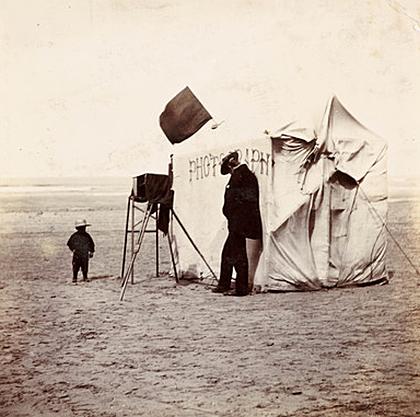
Beach photographer
c 1905
Francis Meadow Sutcliffe
(1853 – 1941)
1 2 3 4
_______________________
from Interstices
Rachel Blau DuPlessis
Letter 8:
(....)
Can you see this
as I describe it? Is it
the feelings that are lacking?
Who can identify and state
the uneasy, twinkling
shifts of feeling
in a dream? And
in the aftermath
to haul “words”
through this portage?
Schlepping overland
(and in which land?)
distrusted, splintery words?
It is the aura
of the human
and it makes one rage
and weep surprised
until all dry of tears.
Alphabetic daze.
Words: always more than
half inadequate.
Cannot even fully tell
a graphic, well-formed dream.
How not to think culture,
signage, skill sets, capacities
for mythography are inadequate.
I mean by being always incomplete.
We cannot acknowledge,
articulate, or even see
intimations
of the real webs and
layers of complexity.
...(more)
Talisman: A Journal of Contemporary Poetry and Poetics Issue # 42
_______________________

French Revolution Digital Archive
A collaboration of
the Stanford University Libraries
and the Bibliothèque nationale de France
_______________________
Special Issue of Common-place
The Civil War at 150: Memory and Meaning
_______________________
Real Revolutionaries Carry a Banjo:
Jesse Drew on Pete Seeger
presented by Pierre Joris
(....)
It is not possible to sum up the contributions of Pete Seeger in this commentary, nor in any article, anthology or book. His connection to the labor rebellions of the Great Depression and the post-War years, battles with HUAC and the anti-communist witch-hunts, participation in the Civil Rights movement in the South, agitation against the wars in Vietnam, Central America, and the Middle East, building a community effort to clean industrial waterways, acting against global warming—these are all rich areas where Pete Seeger would have to be included. To do justice to the legacy of Pete Seeger, indeed, one would have to write about every significant movement for social justice in the United States, if not the world, within the last 80 years.
With his passing, as I try to take the long view of his life, I am tainted not by what I know from books, recordings and word-of-mouth legacy, but by the small personal experiences I had of him.
(....)
In the weeks to come, there will be many eulogies to Pete Seeger. Many will downplay and sanitize who he was, stripping his politics away and leaving a kindly man who played banjo songs about America. Others will question and poison his motives, bringing in the spectre of the Communist Party, USA and when he broke from its Stalinist past. One thing is for sure. A profound link with the long trajectory of revolutionary change in the US has been lost. Someone who understood the links between labor, race, ecology, peace, culture and music. One who understood the importance of bringing masses of people into the struggle, to be respectful, inclusive and inviting. These are all qualities we are in desperate need of today. May his passing inspire the ranks of many new Pete Seegers.
...(more)
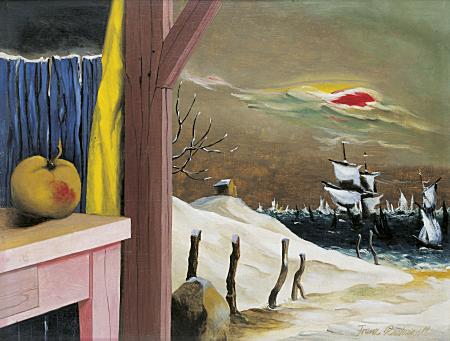
The winter apple
1952
Franz Radziwill
b. February 6, 1895
_______________________
Geographers and Maps: a Relationship in Crisis
Edoardo Boria
abstract
Recent studies have documented a tendency among geographers to reduce their use of maps. Research conducted in the framework of the present study confirms this finding. Possible causes and consequences of this phenomenon are discussed, and a number of contradictions are touched upon, pertaining to geographers' attitudes to maps in an era characterized by a boom in the use of visual tools both in lay and scientific circles.
The phenomenon in question can be observed in the field of political geography as well - a field that has been greatly affected by critical geopolitics and its theoretical insights regarding the way in which we make maps, interpret and use them.
L’Espace Politique
... an electronic open access journal devoted to the political geography and geopolitics. Promote understanding of the political space by presenting theoretical models and conceptual tools applied at all scales (from global to local), but also relevant topics in relation to the news or changes it aims to of these disciplines. Tool for the dissemination of French and Francophone Research Space Policy also publishes occasionally in English. Free journal enables it to contribute to the influence of French researchers, but also the consolidation of these disciplines in the academic field.
_______________________
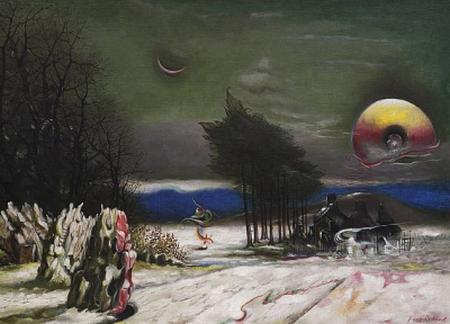
Beautiful Winter
Franz Radziwill
1963
_______________________
M/C Journal Vol. 16, No. 6
'augment'
The Limit and Promise of Augmentation
Rebecca Caines, Michelle Stewart
Always desiring, we create, enhance, and augment: never satiated, we experiment, refine and repeat. Somatic and spatial practices collide on the promise of something more. …
In this issue of M/C Journal we called upon our colleagues to share their forays into multi-media landscapes as they considered augmentation through investigations/collaborations with humans, cyborgs, and nonhumans alike. From computer science to cultural theory, augmentation brings to the table a wide variety of researchers, artists, and practitioners—a wide range of practices and concepts. The pieces in this edition are a strong reflection of how the topic of “augment” can bring together a truly interdisciplinary group. Our goal was to facilitate a critical engagement, and we are thrilled that the call for papers resonated and generated this cluster of articles. Our call for papers was itself meant as a provocation to bring into discussion artists, practitioners, and critical theorists. We asked a series of generative questions to which the authors responded.
...(more)
_______________________
‘The Ontological Grounding of Diversity: A Pragmatic Overview’
Sandra B. Rosenthal
in The Journal of Speculative Philosophy
presented at Synthetic_zero
... pragmatism, in rejecting foundationalism and its respective philosophic baggage, does not embrace the alternative of antifoundationalism or its equivalent dressed up in new linguistic garb. Rather, it rethinks the nature of foundations, standing the tradition on its head, so to speak, and this rethinking incorporates the ontological grounding of diversity.
This rethinking, which incorporates the essentially perspectival nature of experience and knowledge, goes hand in hand with pragmatism’s radical rejection of the spectator theory of knowledge. All knowledge and experience are infused with interpretive aspects, funded with past experience. And all interpretation stems from a perspective, a point of view. Knowledge is not a copy of anything pregiven, but involves a creative organization of experience that directs the way we focus on experience and is tested by its workability in directing the ongoing course of future activities. In this way, experience and knowledge are at once experimental and perspectival in providing a workable organization of problematical or potentially problematical situations. Not only are perspectives real within our environment, but without them there is no environment.
(....)
For pragmatism, mind, thinking, and selfhood are emergent levels of activity of ontologically “thick” organisms within nature. Meaning emerges in the interactions among conscious organisms, in the adjustments and coordinations needed for cooperative action in the social context. In communicative interaction, individuals take the perspective of the other in the development of their conduct, and in this way there develops the common content that provides community of meaning and the social matrix for the emergence of self-consciousness. In incorporating the perspective of the other, the self comes to incorporate the standards and authority of the group; there is a passive dimension to the self Mead calls the “me.” Yet, the individual responds as a unique center of activity; there is a creative dimension to the self, the “I”.
_______________________
Philip Seymour Hoffman talks happiness with Critchley
synthetic_zero
Progressive Geographies
Thinking about place and power
_______________________
An Extract From Thomas Bernhard’s Correction on Death and Taxidermy
Biblioklept
… [But] one day I too shall no longer find a way out, everyone is destined, one day at some moment which is the crucial moment, to find no further way out, that’s how a man is made. … As I ‘d heard something that was different from what I’d been hearing till then, I’d gotten up and gone to post myself at the window, to look outside. The darkness was kept at bay by the workshop lights, Hoeller was busy stuffing a huge bird, I couldn’t see what kind of bird. It was a huge black bird which Hoeller held on his knees, cramming polyurethane into it with a stick. ...(more)
_______________________
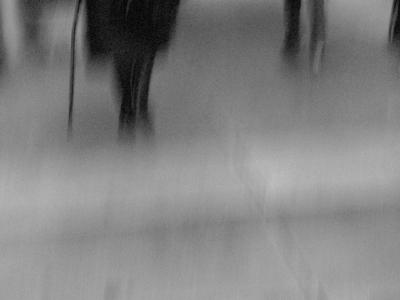
Walking
Robert Farber
more
_______________________
Letters of the Dead
Wislawa Szymborska
Translated from the Polish by Vuyelwa Carlin
We read the letters of the dead like puzzled gods –
gods nevertheless, because we know what happened later.
We know what money wasn’t repaid,
the widows who rushed to remarry.
Poor, unseeing dead,
deceived, fallible, toiling in solemn foolery.
We see the signs made behind their backs,
catch the rustle of ripped-up wills.
They sit there before us, ridiculous
as things perched on buttered bread,
or fling themselves after whisked-away hats.
Their bad taste – Napoleon, steam and electricity,
deadly remedies for curable diseases,
the foolish apocalypse of St. John,
the false paradise on earth of Jean-Jacques . . .
Silently, we observe their pawns on the board
– but shifted three squares on.
Everything they foresaw has happened quite differently,
or a little differently – which is the same thing.
The most fervent stare trustingly into our eyes;
by their reckoning, they’ll see perfection there.
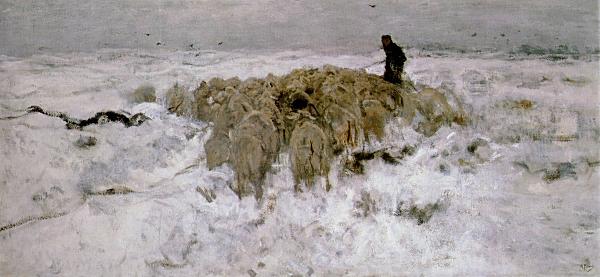
Flock of sheep with shepherd in snow
Anton Mauve
d. 5 February 1888
_______________________
Gaspar Orozco: Ten Prose Poems from AUTOCINEMA, Part One
Translations from Spanish by Mark Weiss
presented by Jerome Rothenberg
Film Projected On A Piano Key
The glazed murmur of the archipelago. Remembering the names of lost cities. The red first letter of each name caught in the act of vanishing. Thus, the disappearance of bridge, column, cupola, almost transparent, like a snake’s eyelid. The temple quivers beneath a yellow leaf. Music in the depths of a submerged pavilion. The tooth of the moon has sunk. The orchestra pauses: the singer intones a secret to the stone. A crack in the bone’s splendor. The note will last forever if anyone dare awaken it.
...(more)
_______________________
Beckett: The Lure of the Image
Mark Bowles
Piccolo
(....)
The solace offered by the mirror image sets a fatal precedent. We forever seek out images as ways of giving to chaos a local habitation and name.
In Beckett’s Texts for Nothing, there are many such images. Mother Calvet, “with her dog and skeletal baby-buggy”, the younger narrator in the waiting room of the railway terminus. These images are like little oases promising a kind of destination or anchor, a place where the self might be located. The restless text almost succumbs to this but then pulls away and, extravagant, flickering, ventures elsewhere. These images, brief wrecks of desolation or beauty, are evidence not that the self is still tied to its past, but of the marmoreal isolation of the latter, revolving forever in another dark, sundered and unreachable.
...(more)
.....................................................
Texts for Nothing 8
Samuel Beckettt
google books
Texts For Nothing No. 8 - Read by Jack MacGowran _______________________

Ice Grip II
(Stockholm)
photo by Mikael Jeney
Interpretation in Winter
Tom Clark
_______________________
The Flâneur, the Badaud and Empathetic Worker
Ekaterina Petrovna Netchitailova
Abstract
In this paper, based on the development of the ‘empathic’ badaud in France at the end of the nineteenth and beginning of the twentieth centuries, I draw some parallels with a Facebook user. The experience of Facebook’s users is explored through the juxtaposition of two terms: the flâneur and the badaud, and a third term is proposed, the one of an empathetic worker, by applying critical media/cultural studies.
tripleC Communication, Capitalism & Critique. Open Access Journal for a Global Sustainable Information Society
_______________________
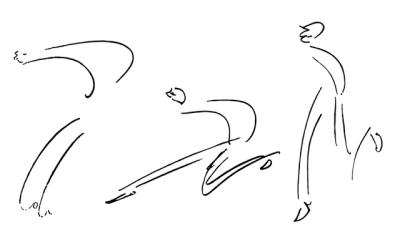
Three Runners
1912-1913
The Art of Franz Kafka:
Drawings from 1907-1917
_______________________
Drunken Boat 18
Debt Folio
Michelle Chan Brown
(....) When Drunken Boat placed the call for poems that examine “the friction between desire and limits, the intersection of ownership and obligation,” I could not anticipate that I would, months after the call, commute through a ghost-town Pennsylvania Avenue, and be self-consciously typing “John Boehner understanding the default” into my browser. As this particular narrative transitions from pathos to bathos and back, however, the process of reading the extraordinary submissions for this folio have clarified one of my suspicions about debt, at least with regard to poetry. Writing and reading are joyous enactments of debt: reader and writer are, like new lovers, perpetually locked into a cycle of captivity and yearning, and it is the very refusal of settlement that reinforces process as pleasure. Reader needs writer needs…the owing, and the refusal of ownership, will not cease. Nor should it.
Rather than present a catalogue of teaser lines from the exceptional poets in this folio, I invite you to enter the process of mutual submission from some of the most exciting voices in poetry: Cynthia Cruz, Sandra Lim, Wesley Rothman, Matthew Lippman, Anna Marie Hong and Kara Candito, to name just a few. The range of subject and formal approach is testament to how profoundly debt threads through our sense of our selves in the world, even before the Federal farrago. I feel privileged to have been reader of these poems, and of the many excellent submissions that could not be included.
...(more)
_______________________
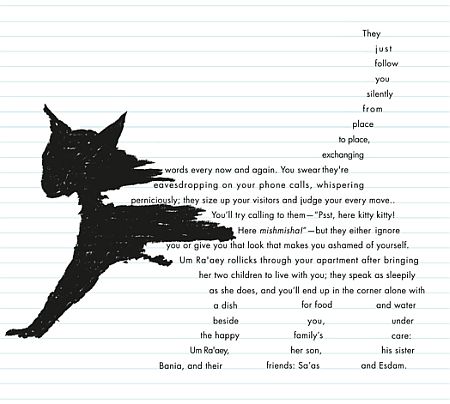
The Apartment in Bab el-Louk
by Donia Maher and Ganzeer
Translated by Elisabeth Jaquette Words without Borders February 2014: International Graphic Novels: Volume VIII
_______________________
Texts for Nothing, 4
Samuel Beckett
....This evening, I say this evening, perhaps it's morning. And all these things, what things, all about me, I won't deny them any more, there's no sense in that any more. If it's nature perhaps it's trees and birds, they go together, water and air, so that all may go on, I don t need to know the details, perhaps I'm sitting under a palm. Or it's a room, with furniture, all that's required to make life comfortable, dark, because of the wall outside the window. What am I doing, talking, having my figments talk, it can only be me. Spells of silence too, when I listen, and hear the local sounds, the world sounds, see what an effort I make, to be reasonable. There's my life, why not, it is one, if you like, if you must, I don't say no, this evening. There has to be one, it seems, once there is speech, no need of a story, a story is not compulsory, just a life, that's the mistake I made, one of the mistakes, to have wanted a story for myself, whereas life alone is enough. I'm making progress, it was time, I'll learn to keep my foul mouth shut before I'm done, if nothing foreseen crops up. But he who somehow comes and goes, unaided from place to place, even though nothing happens to him, true, what of him? I stay here, sitting, if I'm sitting, often I feel sitting, sometimes standing, it's one or the other, or lying down, there's another possibility, often I feel lying down, it's one of the three, or kneeling. What counts is to be in the world, the posture is immaterial, so long as one is on earth. ...(more)
_______________________

Victoria Bridge, Montreal
W. Notman and Sons
1899
Commons:British Library/Picturing Canada

photo - mw
_______________________
New Poems by Richard Martin
exquisite corpse
Distracted Semiotics
Things are being proposed
in the caverns of interpretation
People have tired of disasters
The colossal bank of signs
is too big to collapse
If the planet is an undivided stone
of metaphor and pale dreams
then we should understand polis
as the absence of place
when the universe initiates
a borderless war among words
while we talk to each other
on the cell about talking
to each other on the cell
We’re dropped souls of disconnection
...(more)
_______________________

Albín Brunovský
1935 – 1997
1 2 3
_______________________
Three poems from Eyestone
Hester Knibbe
translated from the Dutch by Jacquelyn Pope
Asymptote
Law
Take water, evident, that feeds the seas
or wind that blows and turns apathetically,
the grass that grows and once again gets
mowed, or us, growing larger at first,
then shrinking wrinkling simplifying
to nothing: always changing. Or
more capriciously: you'll get from A to Z, but then
—just about at J—suddenly fate stands
in your way and takes you off. Where to?
The water shacked up with seas knows.
The wind that leaves no trace knows.
The grass stutters it out under the blade.
...(more)
_______________________
It is not always a comfort to find a like-minded person, another fraction of being who shares one's incompleteness.
--Turtle Diary (p. 59)
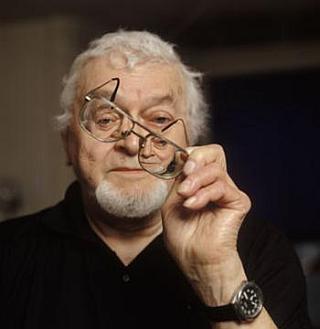
Russell Hoban
b. February 4, 1925
photo by by John Carey
More and more I find that life is a series of disappearances followed usually but not always by reappearances; you disappear from your morning self and reappear as your afternoon self; you disappear from feeling good and reappear feeling bad. And people, even face to face and clasped in each other's arms, disappear from each other.
-- Fremder (p. 32)
_______________________
Translation’s lucky hand
Erín Moure reviews
Fortino Sámano (The Overflowing of the Poem)
Virginie Lalucq and Jean-Luc Nancy
translated by Sylvain Gallais and Cynthia Hogue
To grasp this amazing book — this doubled and redoubled book — is indeed to hold a lucky hand. To read the words of Hogue and Gallais translating Virginie Lalucq and Jean-Luc Nancy is not just to devour a long poem. It is also to receive a device for reading poetry and for exploring the possibilities of lyric address, for opening spaces in and between two languages, French and English.
(....)
Fortino Sámano is poetry in translation that pushes my own relationship with English into a new place of questioning, and that refuses the process of legitimation that so often goes hand in hand with translation, a process that often unwittingly seeks poetry from other languages that reflects, or can be translated as reflecting, values already embedded in American poetry. Fortino Sámano brings something new into North American poetries, not just in the line or in the stanza, not just in the image or its refusal, but in the structure, tension, and extension of the poems as book as well.
...(more)
_______________________
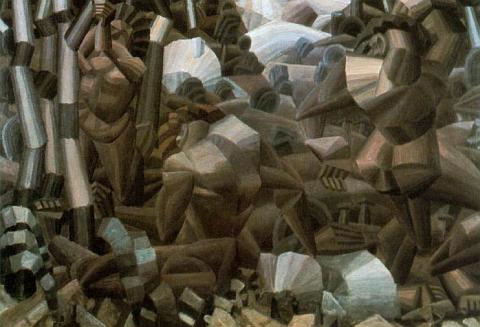 1910
Nudes in the forest
Fernand Léger
b. February 4, 1881

photo - mw
emerging from the polar vortex
_______________________
Otoliths thirty-two
Editor: Mark Young
from The Posit Trilogy
Adam Fieled
To Augustine, after reading his “Confessions”
If you really did find
something or someone
immutable, freed from
torturous progress, I
can’t say I don’t believe—
If you came to rest
apart from the unworkable
aligned profoundly with
profundity’s alignment,
congrats from a still point—
If I seem cynical,
catching your desperation
as tides confounded you,
I at least know your death,
its heft, text, all plumbed
by me, or someone else.
...(more)
Adam Fieled's Miscellaneous
_______________________
handke, weight of the world
flowerville
the handke book, you've read it a longlong time ago, and what you remember were those introvert descriptions of leaves, of sunlight, of pondering the inner life, detailed, delicate observations, serenity, quiet. you found all that again, but you also noticed something you didn't before, and all this made it a less innocent reading experience: the tornness, the bitterness, the latent and also not so latent aggression.
lovely (! author's) intention: this a book of notes that had not been planned. yet they also have been already formed, towards a future purpose not further described, but yet a purpose also not that known that a proper literary form could have been chosen. those forms were neglected, they were forgotten. this forgottenness was regarded as a failure, at first, yet then it lead to the noting/writing of also words fragments without having a purpose in mind for them. from then on only spontaneous notes were scribbled down and in consequence a freedom from any literary forms was experienced which turned into a freedom towards unknown literary possibilities.
it was an exercise to react towards everything with language, immediately, before language would turn into the helpless language of daily life. in such special moments language became more than language, it itself was alive and could be communicated, and it was free from privacy. the concentration on language in this way lead to more and more moments that then became almost constant experiences, a life in writing so to speak.
...(more)
_______________________
Arguments from a Winter’s Walk
Thomas Bernhard
translated by Adam Siegel
conjunctions
(....)
Out here are peculiar valleys, said the doctor, and in these valleys are castles … one goes into them and there is nothing more in the world to seek out, the world whence one came … doors open, and behind them, enthroned, sit people in expensive clothes, as though drawn from nonexistent portraits, unheeding … one enters … one is addressed, seemingly without ever hearing a voice or language … having always been untutored in this art … I know nothing of words … nothing of answers … one doesn’t speak, one just listens—everything has a serviceable name, a label, none of it applied in error, you should know … they say simple things that float above you like a cloudless blue sky … nothing fantastic though it all stems from fantasy … nature—the greatest simplicity, opulence, amiability, nary a trace of sin … not even a hint of discord … a perpetual honeymoon, you should know, just cool reason and the innateness of concepts … all our days and all our nights—comely faces for now and for always … sleeping and waking … the air wrought so clear … my God—how apt! … the slow effect of ideas, feelings, climaxes, feigned amazement … laws that lack the punitive element have a certain validity, mind and temperament united in human nature—logic set to music … old age capable of beauty, youth rising like foothills … in the afternoon the shadows fall … truth lies in the bed of the river, they say, the inscrutable as realization … this is, said the doctor, more like a revelation from a dream, but truer than most means of contemplation …
...(more)
_______________________
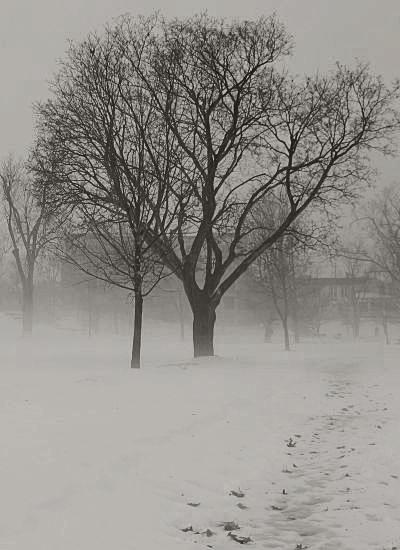
photo - mw
_______________________
The passionate are immobilized.
The case-hardened undulate over walls
of the library, in more or less expressive poses.
The equinox again, not knowing
whether to put the car in reverse
or slam on the brakes at the entrance
to the little alley. Seasons belong
to others than us. Our work keeps us
up late nights; there is no more joy
or sorrow than in what work gives.
A little boy thought the raven on the bluff
was a winged instrument; there is so little
that gives and says it gives. Others
felt themselves ostracized by the moon.
The pure joy of daily living became impacted
with the blood of fate and battles.
There’s no turning back the man says,
the one waiting to take tickets at the top
of the gangplank. Still, in the past
we could always wait a little. Indeed,
we are waiting now. That’s what happens.
from Where Shall I Wander: New Poems, by John Ashbery
|
